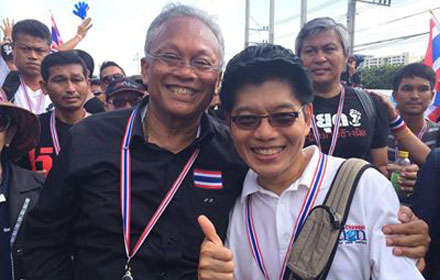Although the junta’s controversial new media bill has triggered outrage, human rights advocates point out that the Thai media should have been protesting the junta’s censorship regulations long ago.
Suchada, a senior journalist from Thai Civil Rights and Investigative Journalism, attributes the muted public response to the failure of mainstream Thai media to represent freedom of expression. As a result, the public sees the bill as a law that will affect only media workers, rather than as a crucial threat to freedom of expression. A few media associations are the only groups actively protesting the bill.
Suchada agrees with limited regulation of the Thai media, due to the media’s potentially significant role in escalating social and political conflict.
Prior to the 2014 coup, many journalists were high profile members of the People’s Democratic Reform Committee (PDRC), an anti-election political movement, and engaged in hate speech against their political opponents. At the turn of the year, some reporters joined the junta head at a party at Government House. These actions have raised the question of whether Thai media can be a proper watchdog.

Kanok Ratwongsakul (right), a leading reporter from The Nation, joined the anti-election protests in 2014. He later posted on his Facebook account that red-shirt protesters are not Thai citizens and that the media that support them are prostitutes. (Photo from Issara)
Suchada concluded that politically-affiliated media are likely to oppose only laws that threaten their political interests, and cannot be relied on to uphold the principles of freedom and democracy. The silence in the mainstream media over the case of Jatuphat ‘Pai’ Boonpattaraksa, the first lèse majesté suspect under King Rama X, obviously proves this point.
As pointed out by
Khaosod English, the Thai Journalists Association (TJA) has consistently had close connections with the military regime. Its sitting president during the 2014 coup, political reporter Pradit Ruangdit from the Bangkok Post, had no qualms accepting an appointment to the junta’s first reform council two years ago. Another former TJA president still sits on the current junta-appointed Constitution Drafting Committee.
Not only does the mainstream media fail as a watchdog, it also exhibits close connections with big corporations. Suchada questioned how the media can freely criticise corporations with the ties they have developed. But despite all these problems, Suchada believes the junta’s harsh media bill is not the solution.
Suchada’s argument was supported by Sunai Phasuk, an advisor to Human Rights Watch (HRW) Thailand. He said that regulations to control media content existed long before the current bill but were little discussed in the mainstream media. Sunai speculates that the mainstream media are instead supportive when such regulations are used against their political opponents.
“A real and powerful [regulation] that has been long enacted is the junta’s NCPO Announcement 97/2014. It prohibits the media from criticising the junta’s administration. People like me cannot be invited to talks on the media or publish an opinion article.
If media associations really want to protect freedom of expression, they should have already been protesting this regulation. They might say they do protest. But how serious are they? They protest when they are condemned and then disappear. But the junta’s orders remain,” Sunai stated.
Sunai stated that HRW’s main concern over the current media bill is the attempt to control ‘media ethics’, which will give the junta broader censorship mechanisms.
Under the Media Protection Bill proposed by the junta’s National Reform Steering Assembly (NRSA), a National Council of Media Professions (NCMP) will be established to ensure that the media industry acts in accordance with the regulations set out under the bill. Without a media license from the NCMP, organisations will not be able to operate.
The bill also sets up a committee to monitor all kinds of media to make sure that they adhere to vaguely defined ‘media ethics’ and do not present news content that violates ‘public morals’. For Sunai, it is hard to believe that these bodies will function impartially and will not eventually become another censorship mechanism.
This the biggest political movement under the King Rama X sofar.
Thai journalists at the junta head’s party at Government House on 15 September 2016 (Photo from Khaosod English) 

